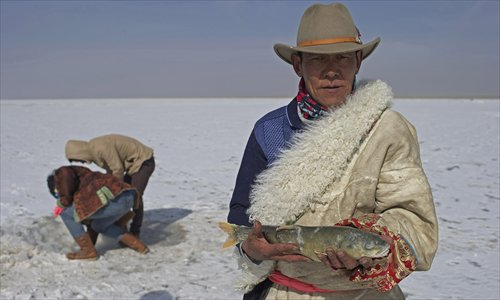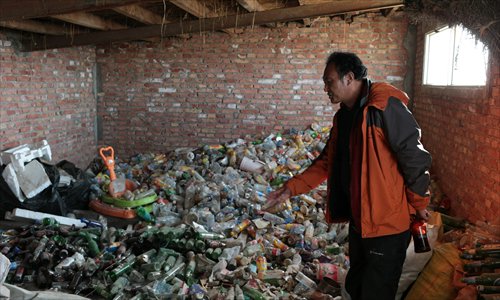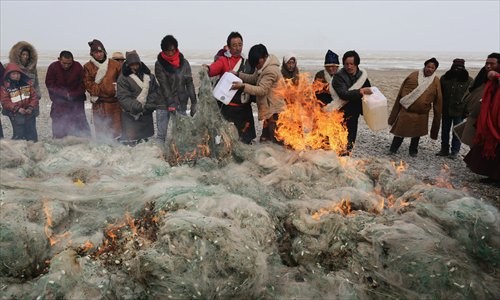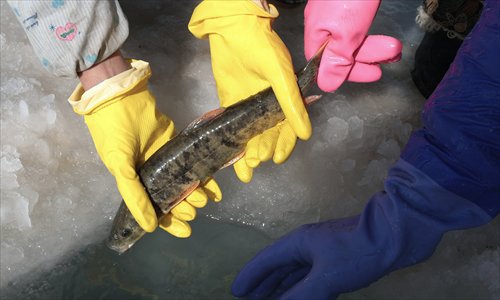HOME >> CHINA
Poacher Patrol
Source:Global Times Published: 2015-3-3 18:53:01

A Tibetan patroller saves a Qinghai Lake naked carp from an illegal fishing net. This fish is still alive and, unusually, is dozens of years old. Photo: Chen Jie
Qinghai Lake, located about 100 kilometers west of Qinghai Province's capital Xining, is the largest lake in China. It faces many environmental challenges. The lake has a surface area of 4,456 square kilometers and an average depth of 21 meters. It has an abundance of fish, such as the Qinghai Lake naked carp, which is found only in the lake.The Qinghai Lake naked carp is listed as being endangered on the China Species Red List due to overfishing and habitat loss. They grow relatively slowly, taking seven to 10 years to reach reproductive age. The carp are a key part of the lake's ecosystem, but the shrinking number of fish is endangering the survival of the water birds that feed on them and hence the entire ecosystem.
Due to the rarity of this fish, diners are eager to eat it. Because the price of a single naked carp can reach 100 yuan ($16), poachers can make good profits from catching them. Between November and March the lake freezes over. It is busy time for poachers. Despite laws prohibiting fishing for the carp, poaching has been rampant in recent years.
In 2010, Nanjia, a local resident together with 30 other volunteers founded the "Qinghai Lake naked carp patrol team." Cooperating with the local fisheries administration, this group has grown into a 400-strong volunteer patrol network. It has become the "eyes" of the fisheries administration.
It usually takes Nanjia and his team five to 10 days to patrol the entire lake once. They will stay at herdsmen's homes or set up tents at night. The people that live around the lake have become friends of the team. If they see suspicious activity, they will call Nanjia. The team will head to the scene as soon as possible and with their experience they can instantly tell if someone is poaching naked carp.
Poachers use electronic nets to catch fish, the batteries of which can pollute the river. When the patrol team seizes one of these illegal nets, they destroy it.
As the locals become more aware of the importance of environmental protection, more and more are joining the patrol team.
The fishing administration responsible for Qinghai Lake said that their resources are insufficient to eradicate illegal fishing in the vast lake. But with the help of these volunteers, the naked carp might stand a chance of survival.
Global Times

Patrollers set out to find illegal poachers and remove their fishing nets. Photo: Chen Jie

Volunteers collect garbage around the lake area for recycling. Photo: Chen Jie

Volunteers burn recently seized illegal fishing nets. Photo: Chen Jie

A patroller carefully frees a captive fish. Photo: Chen Jie
Posted in: In-Depth